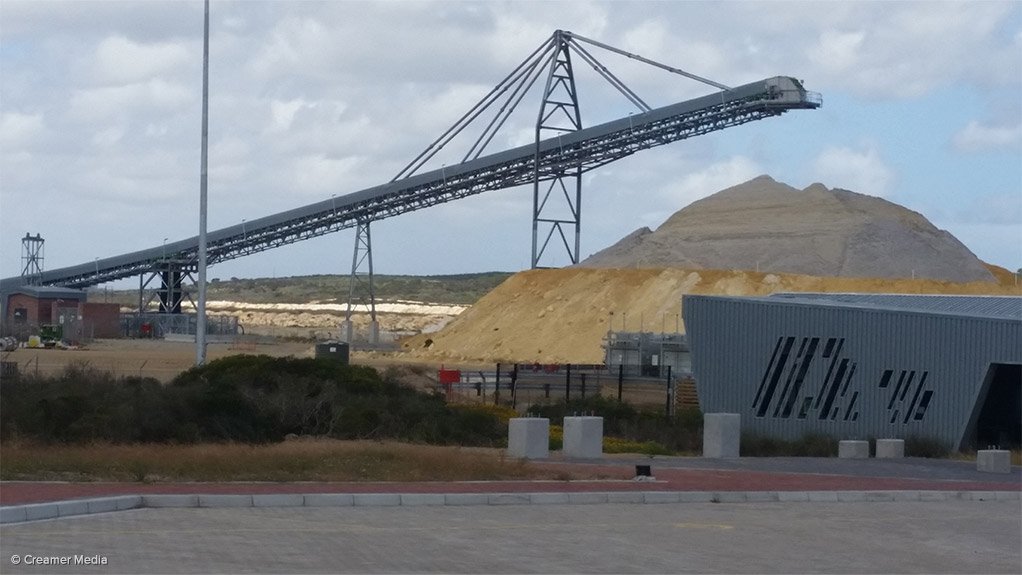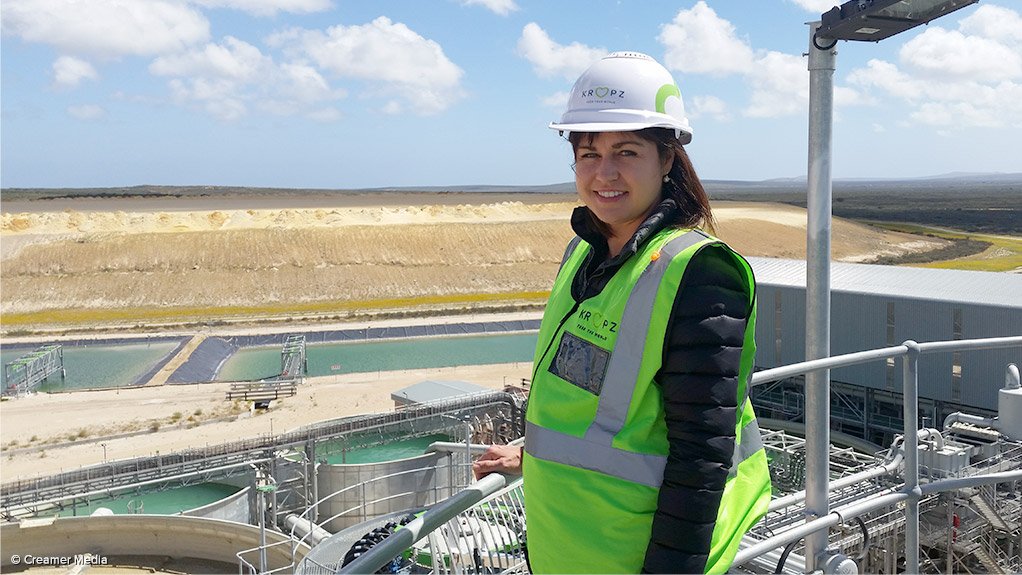Enviro lobby group takes emerging miner to court over phosphate mine’s water-use licence



IN THE CROSS HAIRS Kropz is opposing WCEPA’s application, stating that according to legal advice, the bid to have Elandsfontein’s water-use license revoked has ‘no grounds’
Photo by Creamer Media image
MICHELLE LAWRENCE Kropz has invested about R6-million on groundwater studies which has informed the company's responsible management of the Elandsfontein aquifer’s water
Photo by Creamer Media image
Emerging miner Kropz has warned that the West Coast Environmental Protection Association’s (WCEPA’s) application to have the water-use licence (WUL) for Kropz’s Elandsfontein phosphate mine, near Saldanha Bay, in the Western Cape, suspended, would, if successful, cause “irreversible environmental damage”.
The R1.5-billion mine – a 70:30 joint venture (JV) between Kropz and money management firm African Rainbow Capital – has faced stiff opposition from environmental groups, including the WCEPA, over concerns about the potential impact the mine will have on the environment.
The project is located on land adjacent to the West Coast National Park and the Dunefield Heritage Site, and is 15 km from the Langebaan lagoon.
The WCEPA has filed an urgent interdict in the Western Cape High Court against Kropz, Water and Sanitation Minister Nomvula Mokonyane and the Department of Water and Sanitation.
However, Kropz is opposing the WCEPA’s application, stating that, according to legal advice, the bid by the WCEPA to have Elandsfontein’s WUL revoked has “no grounds”.
During a media visit to the mine last week, Kropz technical director Michelle Lawrence explained that, if, over time, the mine were not able to continue to safely pump the water out of the Elandsfontein aquifer – at a cost of about R1-million a month – and allow it to filter back into the aquifer in accordance with the mine’s dewatering system design, the pit would flood.
She noted that, if dewatering stopped for an extended period, the pit would increase in size, owing to erosion of its sidewalls by the water, while the volume of water in the pit would increase significantly and the water quality would deteriorate, negatively impacting on groundwater.
Kropz groundwater specialist Dr Fanie Botha added that uncontrollable water loss from the enlarged pit, owing to evaporation, would be another consequence. He described the WCEPA’s moves as “illogical”.
Kropz has invested about R6-million in groundwater studies and the development and peer review of the mine’s groundwater model, which have informed the company’s responsible management of the water in the Elandsfontein aquifer.
These studies have been independently reviewed by environmental consultants, including SRK Consulting, GEOS Mining and the University of the Western Cape Institute for Water Studies’ Dr Jaco Nel.
Kropz says these studies concluded that all groundwater monitoring undertaken since Kropz started the dewatering and recharging of the aquifer seven months ago showed these actions were not having a negative impact on the aquifer.
The development of Elandsfontein started in 2009 and it has an estimated life-of-mine of 15 years. The mine is expected to produce about 1.35-million tons of phosphate a year at full production for the local market and export.
However, in August, Elandsfontein was placed on care and maintenance, owing to low global phosphate prices and because the mine needed to reconfigure its processing plant.
Lawrence explained that reconfiguration was necessary, owing to shallower, lower-grade phosphate having to be mined because of a delay in the approval of the mine’s WUL. This delay meant that groundwater levels could not be drawn down as planned to access the full orebody.
Lawrence told Mining Weekly that Kropz expected prices to improve in the next six to nine months and was hopeful that the mine would restart operations during the third quarter of 2018.
About 1 000 people were employed for the construction phase of the project, while more than 450 people – 70% of them locals – will be employed during the course of the mining operations.
Meanwhile, WCEPA, which is represented by law firm Cullinan & Associates, said in a statement that it had opposed the Elandsfontein development from the outset becasue of the “threat it poses to the ecosystems and livelihoods dependent on the Elandsfontein aquifer and Langebaan lagoon”.
WCEPA treasurer Nicola Viljoen said the WCEPA’s experts point out in its appeal to the Water Tribunal that Kropz has not established what the impacts will be of its ongoing abstraction and reinjection of aquifer water, and that there are good reasons for believing that the long-term impacts could be severe.
“Kropz’s current actions are unlawful, and if the pit floods and the walls begin to erode, Kropz has only itself to blame. Mining companies must obtain a number of licences before they begin mining, particularly in environmentally sensitive and water-scarce areas. The law prescribes an integrated authorisation process that can be followed to ensure that all authorisations are consistent and are obtained before mining starts.
“Kropz chose not to follow an integrated process, abandoned its application for an environmental authorisation and recklessly started digging the pit before it had a WUL. Now it is conducting water-use activities unlawfully, while its WUL is suspended by operation of law.
“It is surprising that Kropz considers evaporation of some water as serious harm when it is prepared to divert all the water it extracts from the aquifer to the municipality. The WCEPA made it quite clear that if a WUL were granted, it would lodge an appeal which automatically suspends the WUL. Instead of waiting until the appeal and other foreseeable legal challenges had been resolved before commencing construction, Kropz chose a more reckless approach,” the WCEPA stated.
Kropz has rejected all the WCEPA’s allegations and has stressed that all its findings were based on “hard science” and that it had received all the required permits for the mine.
Additionally, civic association Hopefield Community Forum and Hopefield farmer association member Jan Hanekom told Mining Weekly that most local community members supported the Elandsfontein project. “Elandsfontein represents a significant opportunity for job creation and economic enhancement of the region, particularly for the majority of the residents, who comprise underprivileged black and coloured people.”
Article Enquiry
Email Article
Save Article
Feedback
To advertise email advertising@creamermedia.co.za or click here
Announcements
What's On
Subscribe to improve your user experience...
Option 1 (equivalent of R125 a month):
Receive a weekly copy of Creamer Media's Engineering News & Mining Weekly magazine
(print copy for those in South Africa and e-magazine for those outside of South Africa)
Receive daily email newsletters
Access to full search results
Access archive of magazine back copies
Access to Projects in Progress
Access to ONE Research Report of your choice in PDF format
Option 2 (equivalent of R375 a month):
All benefits from Option 1
PLUS
Access to Creamer Media's Research Channel Africa for ALL Research Reports, in PDF format, on various industrial and mining sectors
including Electricity; Water; Energy Transition; Hydrogen; Roads, Rail and Ports; Coal; Gold; Platinum; Battery Metals; etc.
Already a subscriber?
Forgotten your password?
Receive weekly copy of Creamer Media's Engineering News & Mining Weekly magazine (print copy for those in South Africa and e-magazine for those outside of South Africa)
➕
Recieve daily email newsletters
➕
Access to full search results
➕
Access archive of magazine back copies
➕
Access to Projects in Progress
➕
Access to ONE Research Report of your choice in PDF format
RESEARCH CHANNEL AFRICA
R4500 (equivalent of R375 a month)
SUBSCRIBEAll benefits from Option 1
➕
Access to Creamer Media's Research Channel Africa for ALL Research Reports on various industrial and mining sectors, in PDF format, including on:
Electricity
➕
Water
➕
Energy Transition
➕
Hydrogen
➕
Roads, Rail and Ports
➕
Coal
➕
Gold
➕
Platinum
➕
Battery Metals
➕
etc.
Receive all benefits from Option 1 or Option 2 delivered to numerous people at your company
➕
Multiple User names and Passwords for simultaneous log-ins
➕
Intranet integration access to all in your organisation



















